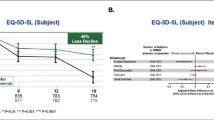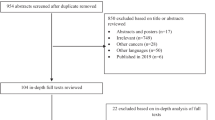Abstract
Goal of the work
The quality of life (QoL) of patients with cancer is a major area of concern for both patients and their physicians. The independent contribution of functional impairment and co-morbidity to QoL is unclear.
Materials and methods
We investigated initial global QoL in 477 patients: 195 cancer patients aged 60 years or older (group A), 152 cancer patients below the age of 60 years (group B), admitted as inpatients for chemotherapy initiation and 130 patients aged 60 years or older admitted for non-cancer-related disorders (group C). Global QoL was assessed by the EORTC-QLQ-C30 subscale, functional status by the Karnofsky Performance Scale (KPS) and the Instrumental Activities of Daily Living (IADL) scale, and co-morbidity by the Cumulative Illness Rating Scale (CIRS).
Results
In multivariate analyses, global QoL is significantly associated with KPS, IADL and co-morbidity in group A (r 2 = 0.27), with KPS and IADL in group B (r 2 = 0.23), and with age, KPS and IADL in group C (r 2 = 0.38).
Conclusions
IADL contributes to global QoL in addition to the known effect of KPS. In addition, co-morbidity independently influences global QoL in elderly cancer patients.

Similar content being viewed by others
References
Parkin DM, Bray F, Ferlay J et al (2005) Global cancer statistics, 2002. CA Cancer J Clin 55(2):74–108
Edwards BK, Howe HL, Ries LA et al (2002) Annual report to the nation on the status of cancer, 1973–1999, featuring implications of age and aging on U.S. cancer burden. Cancer 94(10):2766–2792
Karnofsky DA, Adelmann WH, Craver FL (1948) The use of nitrogen mustard in the palliative treatment of carcinoma. Cancer 1:634–656
Buccheri G, Ferrigno D, Tamburini M (1996) Karnofsky and ECOG performance status scoring in lung cancer: a prospective, longitudinal study of 536 patients from a single institution. Eur J Cancer 32A(7):1135–1141
Mor V, Laliberte L, Morris JN et al (1984) The Karnofsky performance status scale. An examination of its reliability and validity in a research setting. Cancer 53(9):2002–2007
Yates JW, Chalmer B, McKegney FP (1980) Evaluation of patients with advanced cancer using the Karnofsky performance status. Cancer 45(8):2220–2224
Conill C, Verger E, Salamero M (1990) Performance status assessment in cancer patients. Cancer 65(8):1864–1866
Mahoney FI, Barthel DW (1965) Functional evaluation. Md Med J 14:61–65
Lawton MP, Brody EM (1969) Assessment of older people: self-maintaining and instrumental activities of daily living. Gerontologist 9(3):179–186
Extermann M, Overcash J, Lyman GH et al (1998) Comorbidity and functional status are independent in older cancer patients. J Clin Oncol 16(4):1582–1587
Schaafsma J, Osoba D (1994) The Karnofsky performance status scale re–examined: a cross–validation with the EORTC–C30. Qual Life Res 3(6):413–424
Charlson ME, Pompei P, Ales KL et al (1987) A new method of classifying prognostic comorbidity in longitudinal studies: development and validation. J Chronic Dis 40(5):373–383
Extermann M (2000) Measuring comorbidity in older cancer patients. Eur J Cancer 36(4):453–471
Kempen GI, Ormel J, Brilman EI et al (1997) Adaptive responses among Dutch elderly: the impact of eight chronic medical conditions on health-related quality of life. Am J Public Health 87(1):38–44
Michelson H, Bolund C, Brandberg Y (2000) Multiple chronic health problems are negatively associated with health related quality of life (HRQoL) irrespective of age. Qual Life Res 9(10):1093–104
Trentham-Dietz A, Remington PL, Moinpour CM et al (2003) Health-related quality of life in female long-term colorectal cancer survivors. Oncologist 8(4):342–349
Vacek PM, Winstead-Fry P, Secker-Walker RH et al (2003) Factors influencing quality of life in breast cancer survivors. Qual Life Res 12(5):527–537
Sarna L, Padilla G, Holmes C et al (2002) Quality of life of long-term survivors of non-small-cell lung cancer. J Clin Oncol 20(13):2920–2929
Aaronson NK, Ahmedzai S, Bergman B et al (1993) The European Organization for Research and Treatment of cancer QLQ–C30: a quality-of-life instrument for use in international clinical trials in oncology. J Natl Cancer Inst 85(5):365–376
Linn BS, Linn MW, Gurel L (1968) Cumulative illness rating scale. J Am Geriatr Soc 16(5):622–626
Pinquart M, Duberstein PR (2004) Information needs and decision-making processes in older cancer patients. Crit Rev Oncol Hematol 51(1):69–80
Hjermstad MJ, Fayers PM, Bjordal K et al (1998) Health-related quality of life in the general Norwegian population assessed by the European Organization for Research and Treatment of Cancer Core Quality-of-Life Questionnaire: the QLQ = C30 (+3). J Clin Oncol 16(3):1188–1196
Schwarz R, Hinz A (2001) Reference data for the quality of life questionnaire EORTC QLQ-C30 in the general German population. Eur J Cancer 37(11):1345–1351
Michelson H, Bolund C, Nilsson B et al (2000) Health–related quality of life measured by the EORTC QLQ-C30—reference values from a large sample of Swedish population. Acta Oncol 39(4):477–484
Thome B, Dykes AK, Hallberg IR (2004) Quality of life in old people with and without cancer. Qual Life Res 13(6):1067–1080
Schag CA, Ganz PA, Wing DS et al (1994) Quality of life in adult survivors of lung, colon and prostate cancer. Qual Life Res 3(2):127–141
Chang VT, Hwang SS, Feuerman M et al (2000) Symptom and quality of life survey of medical oncology patients at a veterans affairs medical center: a role for symptom assessment. Cancer 88(5):1175–1183
Hollen PJ, Gralla RJ, Kris MG et al (1994) Measurement of quality of life in patients with lung cancer in multicenter trials of new therapies. Psychometric assessment of the lung cancer symptom scale. Cancer 73(8):2087–2098
Llobera J, Esteva M, Benito E et al (2003) Quality of life for oncology patients during the terminal period. Validation of the HRCA-QL index. Support Care Cancer 11(5):294–303
Hollen PJ, Gralla RJ, Kris MG et al (1999) Normative data and trends in quality of life from the Lung Cancer Symptom Scale (LCSS). Support Care Cancer 7(3):140–148
Thome B, Hallberg IR (2004) Quality of life in older people with cancer—a gender perspective. Eur J Cancer Care (Engl) 13(5):454–463
Elliott BA, Renier CM, Haller IV et al (2004) Health-related quality of life (HRQoL) in patients with cancer and other concurrent illnesses. Qual Life Res 13(2):457–462
Greimel ER, Padilla GV, Grant MM (1997) Physical and psychosocial outcomes in cancer patients: a comparison of different age groups. Br J Cancer 76(2):251–255
Friedrich C, Kolb G, Wedding U et al (2003) Comprehensive geriatric assessment in the elderly cancer patient. Onkologie 26(4):355–360
Extermann M, Aapro M, Bernabei R et al (2005) Use of comprehensive geriatric assessment in older cancer patients: recommendations from the task force on CGA of the International Society of Geriatric Oncology (SIOG). Crit Rev Oncol Hematol 55(3):241–252
Acknowledgement
The study was supported by German Cancer Aid (Grant No. 70-2445-Hö-3). Ulrich Wedding is currently a research fellow of the “Forschungskolleg Geriatrie” of the Robert Bosch Foundation, Stuttgart.
Conflict of interest statement
None of the authors has to indicate a potential source of conflict of interest.
Author information
Authors and Affiliations
Corresponding author
Rights and permissions
About this article
Cite this article
Wedding, U., Röhrig, B., Klippstein, A. et al. Co-morbidity and functional deficits independently contribute to quality of life before chemotherapy in elderly cancer patients. Support Care Cancer 15, 1097–1104 (2007). https://doi.org/10.1007/s00520-007-0228-9
Received:
Accepted:
Published:
Issue Date:
DOI: https://doi.org/10.1007/s00520-007-0228-9




